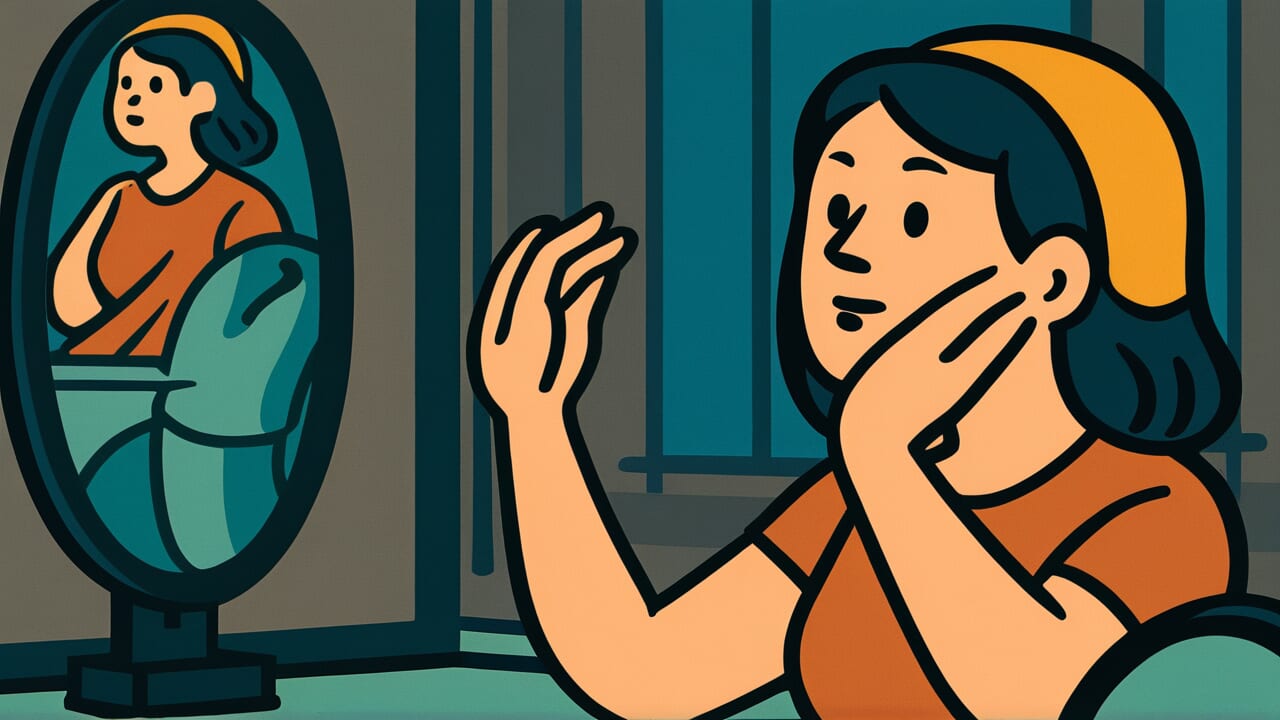How to Read “A wicked woman hates the mirror”
Akujo wa kagami o utōmu
Meaning of “A wicked woman hates the mirror”
This proverb means that people who know their own ugliness hate things that show the truth. People who understand their own faults deep down try to avoid anything that clearly points them out.
Just like an ugly woman doesn’t want to look in a mirror, people who know their weaknesses hate honest words and truthful criticism. This saying is used to describe people who avoid criticism, get angry when someone points out their faults, or turn away from uncomfortable truths.
We use this expression because mirrors are everyday objects everyone knows. They perfectly describe human psychology. Even today, this proverb works well when talking about people who hate helpful advice or avoid thinking about themselves.
It teaches us, in a backwards way, how important it is to accept the truth.
Origin and Etymology
There are no clear written records about where this proverb came from. But we can learn interesting things by looking at the words themselves.
The word “akujo” (wicked woman) here means a woman who is ugly on the outside. In old Japanese, “aku” (wicked) didn’t just mean morally bad. It also meant ugly in appearance.
The word “kagami” (mirror) means a tool that shows truth exactly as it is. Since ancient times, mirrors have been symbols of facing yourself honestly.
This proverb probably came from watching people back when mirrors were rare and expensive. Even among wealthy people who could afford mirrors, those who felt bad about their looks would avoid them. This shows deep understanding of human psychology.
What’s interesting is that this proverb isn’t just about looks. It contains a deeper lesson. Hating a mirror that shows truth represents how people turn away from their own faults and weaknesses.
When you know you’re ugly, you naturally want to avoid things that show it clearly. This psychology touches on something basic about human nature that never changes.
This proverb is wisdom from our ancestors. They used the simple comparison of mirrors and appearance to show how foolish it is to run from the truth.
Usage Examples
- He knows there are problems with his work, so he avoids performance reviews with his boss. That’s exactly “A wicked woman hates the mirror.”
- Taking all criticism as a personal attack is “A wicked woman hates the mirror” – maybe he’s aware of his own weaknesses.
Universal Wisdom
The universal truth in this proverb is about human self-defense instinct. Why do people turn away from truth? Because admitting your faults causes psychological pain.
What’s interesting is that this proverb assumes you “know” about your faults. People who are completely unaware don’t hate mirrors. You avoid things that clearly show the truth only when you already sense your ugliness.
This subtle psychological state shows how complex humans are.
Hating a mirror that shows truth is actually about humans caught between self-awareness and self-deception. We don’t want to fully admit our faults, but we can’t completely ignore them either.
This inner conflict appears as rejection of things that show us the truth.
This proverb has lasted so long because this psychology never changes across time. Ancient people and modern people both struggle equally with facing their own weaknesses.
Technology advances and society changes, but the human heart that wants to avoid truth stays the same.
Our ancestors understood this unavoidable part of human nature. They compared it to mirrors, everyday objects, so everyone could understand the lesson. That’s why it survived through the ages.
When AI Hears This
The human brain really hates holding contradictory information at the same time. Psychologist Leon Festinger’s experiments showed that most people, when faced with facts that contradict their beliefs, either deny or avoid those facts.
The “hating the mirror” behavior in this proverb is exactly this. It’s the most basic way to resolve cognitive dissonance: eliminate the source of uncomfortable information.
What’s interesting is the mirror’s “immediacy” and “unedited nature.” You can explain away other people’s opinions as “just their personal taste.” But mirrors give no room for excuses.
They show you your appearance through your own eyes, in real-time, with no filters. This mercilessness makes the gap between self-image and reality extremely clear.
In modern terms, it’s like how companies dislike whistleblowers who point out wrongdoing. The whistleblower acts as the “organization’s mirror,” showing the gap between the company’s self-image (“we’re honest”) and reality.
So the organization tries to remove the whistleblower instead of fixing the problem. Eliminating the information source costs less psychological energy than changing reality to protect their self-concept.
In other words, humans are less creatures who seek truth and more creatures who protect the story they want to believe.
Lessons for Today
This proverb teaches modern people that growth opportunities often hide in words that hurt to hear. If you hate mirrors that reflect yourself, you can’t face your true self.
What’s important is noticing your own reaction when you receive criticism or feedback. If you feel strong rejection, that might be proof you’ve been hit where it hurts. That exact moment is your best chance to look at yourself honestly.
In modern society, we’re too used to making ourselves look good on social media. We have fewer chances to face ourselves as we really are. But true growth starts with self-awareness.
Having courage to look in the mirror – meaning accepting truth – leads you in a better direction.
No one is perfect. Everyone has faults. The strength to admit that is real strength. Don’t hate mirrors that show truth. Use them as tools for growth.
This attitude will make your life richer as you live in the modern world.



Comments